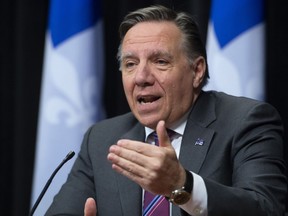Opinion: Anglos' COVID-19 anxiety should be understood, not deflected
Premier François Legault should review report on the anxieties of Quebec’s non-francophones and determine how best to address the concerns.

Article content
A new Léger Marketing survey for the Association for Canadian Studies and the Quebec Community Groups Network reveals that Quebec anglophones and allophones are far more afraid than francophones of contracting COVID-19. These findings emerged from the largest survey of Quebec anglophones conducted to date around anxieties arising from COVID-19. When asked Wednesday about the findings, Premier François Legault wondered why francophones and anglophones would feel differently and appeared to attribute the gap to reporting on the contagion by the Montreal Gazette.
To the premier’s credit, he has conducted himself in a very dignified manner in his handling of this unparalleled crisis for which admittedly there are no easy answers. It was thus all the more regrettable to hear the premier diminish the sincerely expressed anxieties of many English-speaking Quebecers, most of whom are concentrated on the island of Montreal, where he has regularly reminded us that the number of cases and fatalities are the highest in the province. In fact, the premier, the health minister and leading provincial health officials have described Montreal, and notably the western part of the island, as the epicentre of the contagion. In light of this, one can’t blame Quebecers who reside on the island for not always feeling reassured when they hear that “ça va bien aller.”
The ACS-QCGN survey reveals that some 34 per cent of Quebec anglophones know someone who has been diagnosed with the virus compared with 21 per cent of francophones. That partly explains the differences in levels of anxiety respectively felt by anglophones and francophones. It is worth noting that those Quebec allophones surveyed reported higher levels of fear of getting the virus than did anglophones, as well as a higher percentage knowing someone that has been diagnosed with the virus.
Across the country, there is a wide spectrum of anxiety arising from COVID-19. Surveys reveal that seniors are more afraid of getting the virus than young persons, women more so than men, immigrants more than non-immigrants and visible minorities more than non-visible minorities. In the case of Quebec, the data point out that people residing outside of Montreal are less afraid of getting COVID-19 than those residing in the city. In homes across the province, the varying degrees of fear have been the object of intense conversation and occasional friction, a microcosm of what is undoubtedly happening around the province and elsewhere.
Paradoxically, those Quebecers expressing higher degrees of anxiety about COVID-19 are far more likely than others to adhere to the guidelines issued by the government to prevent the spread of the contagion. They were more likely to stay home when asked by officials to do so, they were more likely to practise social distancing and have been more inclined to wear protective masks when going outside. They are also the least likely to agree that the pandemic is being blown out of proportion. Conversely, those expressing the least anxiety have been consistently less inclined to follow the advice of health authorities in Quebec and elsewhere in Canada.
This is not to say that heightened anxiety is necessarily a good thing, but rather, that we need to be sensitive to such feelings and try to comprehend them instead of deflecting them. In this regard, Legault is better served in revisiting his observations, reviewing the report on the anxieties of Quebec’s non-francophones and determining how best to address the concerns.
All Quebecers need to work closely together with our elected officials, including the premier, to address this unprecedented situation. To do so will require a high level of sensitivity in response to the diverse range of concerns that have arisen since the outbreak of the contagion. We’ll also need to be mindful of the considerable challenges that our political leaders are facing in charting the right path forward for us all.
Jack Jedwab is president of the Association for Canadian Studies and Chairs the Covid 19 Social Impacts Network.
Note to readers: We know the speed and volume of coronavirus-related news is overwhelming and a little frightening. To help with that, our daily live blog synthesizes the most important coronavirus-related news, especially as it relates to life in Montreal and Quebec. Follow the updates for May 14 here.
All our coronavirus-related news can always be found at montrealgazette.com/tag/coronavirus.
Sign up for our email newsletter dedicated to local COVID-19 coverage at montrealgazette.com/coronavirusnews.
Help support our local journalism by subscribing to the Montreal Gazette here.






Postmedia is committed to maintaining a lively but civil forum for discussion. Please keep comments relevant and respectful. Comments may take up to an hour to appear on the site. You will receive an email if there is a reply to your comment, an update to a thread you follow or if a user you follow comments. Visit our Community Guidelines for more information.